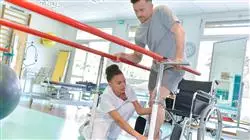University certificate
Accreditation/Membership
The world's largest faculty of physiotherapy”
Introduction to the Program
Through this program, you will master the most innovative techniques in Neurological Physiotherapy and enhance the overall well-being of patients with various nervous system disorders”

A recent study conducted by the World Health Organization estimates that over 60 million people suffer from some form of Neurodegenerative Disorder. In light of this reality, the organization emphasizes the growing need to develop highly effective therapeutic approaches that go beyond traditional medical management. In this context, Neurological Physiotherapy is becoming a key intervention to assist individuals in their functional recovery. Therefore, professionals need to handle the most modern therapeutic interventions to improve mobility, reduce muscle stiffness, and increase user independence.
In response to this framework, TECH presents an innovative program in Neurological Physiotherapy. Developed by leading experts in the field, the academic pathway will delve into areas ranging from epidemiological foundations to the clinical specifics of the main Neurodegenerative Diseases. The syllabus will provide graduates with the most cutting-edge diagnostic methods to early identify signs of conditions such as Multisystem Atrophy, Multiple Sclerosis, or Acquired Brain Injury. Thanks to this, professionals will develop advanced clinical competencies to design personalized physiotherapy intervention plans, improving the quality of life for patients, optimizing their functional recovery, and promoting their autonomy.
To reinforce these concepts, TECH relies on the revolutionary Relearning method. This learning system promotes a natural and progressive assimilation of content, without resorting to the traditional memorization process. Furthermore, specialists only need a device with internet access to update their knowledge. In this regard, experts have full freedom to individually plan their schedules and educational timelines. Additionally, on the Virtual Campus, they will have access to a library full of multimedia support resources, including detailed videos, specialized readings based on the latest scientific evidence, and interactive summaries.
You will gain a multidisciplinary approach focused on patients, promoting both functional recovery and long-term emotional well-being”
This Advanced master’s degree in Neurological Physiotherapy contains the most complete and up-to-date scientific program on the market. The most important features include:
- The development of practical case studies presented by experts in Neurological Physiotherapy
- The graphic, schematic, and practical contents with which they are created, provide scientific and practical information on the disciplines that are essential for professional practice
- Practical exercises where self-assessment can be used to improve learning
- Its strong emphasis on innovative methodologies in physiotherapy practice
- Theoretical lessons, questions to the expert, debate forums on controversial topics, and individual reflection assignments
- Content that is accessible from any fixed or portable device with an internet connection
You will master the key tools of Information and Communication Technologies to monitor patients' clinical status in real-time”
The teaching staff includes professionals from the field of Neurological Physiotherapy, who bring their work experience to the program, as well as recognized specialists from leading societies and prestigious universities.
The multimedia content, developed with the latest educational technology, will provide the professional with situated and contextual learning, i.e., a simulated environment that will provide an immersive learning experience designed to prepare for real-life situations.
This program is designed around Problem-Based Learning, whereby the student must try to solve the different professional practice situations that arise throughout the program. For this purpose, the professional will be assisted by an innovative interactive video system created by renowned and experienced experts.
You will delve into the most effective strategies to prevent Musculoskeletal Complications and Chronic Pain in patients with Acquired Brain Injury"

Thanks to TECH's revolutionary Relearning system, you will assimilate essential concepts quickly, naturally, and accurately. Forget about memorizing!"
Why study at TECH?
TECH is the world’s largest online university. With an impressive catalog of more than 14,000 university programs available in 11 languages, it is positioned as a leader in employability, with a 99% job placement rate. In addition, it relies on an enormous faculty of more than 6,000 professors of the highest international renown.

Study at the world's largest online university and guarantee your professional success. The future starts at TECH”
The world’s best online university according to FORBES
The prestigious Forbes magazine, specialized in business and finance, has highlighted TECH as “the world's best online university” This is what they have recently stated in an article in their digital edition in which they echo the success story of this institution, “thanks to the academic offer it provides, the selection of its teaching staff, and an innovative learning method aimed at educating the professionals of the future”
A revolutionary study method, a cutting-edge faculty and a practical focus: the key to TECH's success.
The most complete study plans on the university scene
TECH offers the most complete study plans on the university scene, with syllabuses that cover fundamental concepts and, at the same time, the main scientific advances in their specific scientific areas. In addition, these programs are continuously being updated to guarantee students the academic vanguard and the most in-demand professional skills. In this way, the university's qualifications provide its graduates with a significant advantage to propel their careers to success.
TECH offers the most comprehensive and intensive study plans on the current university scene.
A world-class teaching staff
TECH's teaching staff is made up of more than 6,000 professors with the highest international recognition. Professors, researchers and top executives of multinational companies, including Isaiah Covington, performance coach of the Boston Celtics; Magda Romanska, principal investigator at Harvard MetaLAB; Ignacio Wistumba, chairman of the department of translational molecular pathology at MD Anderson Cancer Center; and D.W. Pine, creative director of TIME magazine, among others.
Internationally renowned experts, specialized in different branches of Health, Technology, Communication and Business, form part of the TECH faculty.
A unique learning method
TECH is the first university to use Relearning in all its programs. It is the best online learning methodology, accredited with international teaching quality certifications, provided by prestigious educational agencies. In addition, this disruptive educational model is complemented with the “Case Method”, thereby setting up a unique online teaching strategy. Innovative teaching resources are also implemented, including detailed videos, infographics and interactive summaries.
TECH combines Relearning and the Case Method in all its university programs to guarantee excellent theoretical and practical learning, studying whenever and wherever you want.
The world's largest online university
TECH is the world’s largest online university. We are the largest educational institution, with the best and widest online educational catalog, one hundred percent online and covering the vast majority of areas of knowledge. We offer a large selection of our own degrees and accredited online undergraduate and postgraduate degrees. In total, more than 14,000 university degrees, in eleven different languages, make us the largest educational largest in the world.
TECH has the world's most extensive catalog of academic and official programs, available in more than 11 languages.
Google Premier Partner
The American technology giant has awarded TECH the Google Google Premier Partner badge. This award, which is only available to 3% of the world's companies, highlights the efficient, flexible and tailored experience that this university provides to students. The recognition as a Google Premier Partner not only accredits the maximum rigor, performance and investment in TECH's digital infrastructures, but also places this university as one of the world's leading technology companies.
Google has positioned TECH in the top 3% of the world's most important technology companies by awarding it its Google Premier Partner badge.
The official online university of the NBA
TECH is the official online university of the NBA. Thanks to our agreement with the biggest league in basketball, we offer our students exclusive university programs, as well as a wide variety of educational resources focused on the business of the league and other areas of the sports industry. Each program is made up of a uniquely designed syllabus and features exceptional guest hosts: professionals with a distinguished sports background who will offer their expertise on the most relevant topics.
TECH has been selected by the NBA, the world's top basketball league, as its official online university.
The top-rated university by its students
Students have positioned TECH as the world's top-rated university on the main review websites, with a highest rating of 4.9 out of 5, obtained from more than 1,000 reviews. These results consolidate TECH as the benchmark university institution at an international level, reflecting the excellence and positive impact of its educational model.” reflecting the excellence and positive impact of its educational model.”
TECH is the world’s top-rated university by its students.
Leaders in employability
TECH has managed to become the leading university in employability. 99% of its students obtain jobs in the academic field they have studied, within one year of completing any of the university's programs. A similar number achieve immediate career enhancement. All this thanks to a study methodology that bases its effectiveness on the acquisition of practical skills, which are absolutely necessary for professional development.
99% of TECH graduates find a job within a year of completing their studies.
Advanced Master's Degree in Neurological Physiotherapy
Neurodegenerative diseases and Acquired Brain Injury (ABI) continue to be significant challenges, with physiotherapy providing considerable support. It is known that disorders such as stroke, which has a prevalence of 200 cases annually per 100,000 inhabitants and is the second leading cause of death globally according to the WHO, affect psychomotor functions to such an extent that quality neurorehabilitation is essential. The Advanced Master's Degree in Neurological Physiotherapy from TECH Global University focuses on this objective, along with its fundamental aspects. Through a fully virtual methodology based on strategic techniques for higher learning, we provide you with a solid set of theoretical and practical tools to enhance both the diagnosis and treatment of your patients. Our flexible class system also allows you to manage your own schedule, enabling you to train while simultaneously engaging in other activities. If your goal is to provide unsurpassed physiotherapy services, take the step to explore our prestigious educational institution.
Earn your online qualification in Neurological Physiotherapy
Multiple sclerosis, Parkinson's, and Alzheimer's are complex disorders that require an interdisciplinary approach, where various health specialists collaborate. Neurophysiotherapy plays one of these critical roles, as it is through this intervention that existing neurological pathways are reinforced and new ones created, aiming to restore patient mobility. Whether caused by trauma, a stroke (CVA), or pathologies such as those described initially, neurological physiotherapy is indispensable for treating motor deficiencies of the central nervous system. This postgraduate program is the ideal opportunity to acquire all the necessary competencies in this branch of physiotherapy. Our syllabus is divided into two main blocks: the first addresses neurodegenerative diseases, while the second focuses on Acquired Brain Injury. Each of these blocks is methodically structured with interactive material and lessons guided by a panel of experts. Looking to enhance your resume? Enroll at TECH and do so with the highest standards.







